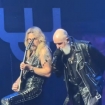Let's face it: Most metal covers are pretty pointless.
For one thing, a lot of the better metal covers are of already great songs, classic tunes for which there's little to no room for improvement. Most of these covers end up being either reverent retreads or try-too-hard reaches.
On the other hand, there are the metal covers of bad songs. These almost always end up being ironic novelty-bin throwaways, faintly amusing but nothing you're going to spin on repeat.
Then you have the few, legitimately great covers that actually eclipse the originals, covers that somehow sound the way the originals were meant to sound all along, or that alchemically flip the originals into something altogether different and revelatory.
These are the covers we celebrate here. Below are 10 of our favorites.
Crowbar - "Dream Weaver"
Crowbar main man Kirk Windstein is a whole-hearted lover of all types of Seventies music, from Sly and the Family Stone to the Saturday Night Fever soundtrack. So when his sludge-metal band covered Gary Wright's 1975 hit, "Dream Weaver," it wasn't a tongue-in-cheek gag, but a reverent and worthwhile reconstruction of a great song that was due for a way-less-schmaltzy delivery. Amazingly, this heavy, plodding rendition is every bit as catchy as the original, and the squalls of effect-ridden guitars — not to mention Windstein's soulful belt — click together with surprising grace.
Deftones - "Do You Believe?"
Deftones are prolific cover artists, having taken on songs by Depeche Mode, the Cure, Helmet, Jawbox, Sade, Skynyrd and more. Their covers are always great, but few top the canonical originals. However, in the case of their rendition of the Cardigan's 1998 deep cut "Do You Believe?," there's no going back once you've heard the 'Tones version. The original's keyboard riff is just meant to be played on Stephen Carpenter's down-tuned guitar, and Chino's breathy and biting vocals fit the song's cynical desperation way better than Nina Persson's lilting tones.
Ghost - "Crucified"
Masters of the cover song, Ghost totally transform Army of Lover's campy early Nineties hit "Crucified" into something altogether different and way more awesome. The Swedish dance-pop group's original takes ABBA's glittery disco to its glammiest, cheesiest extreme. In Papa Emeritus II and the Ghouls' hands, the song is sinister, yearning and, of course, so very Satanic. It's barely recognizable — in the best way possible.
Judas Priest - "Green Manalishi"
"The Green Manalishi" is actually one of Fleetwood Mac's heavier tunes, but Judas Priest absolutely obliterated the Zeppelin-lite original when they covered it in 1979. The guitar tones are chunkier, the drums hit harder, Halford's voice actually makes you want to get up out of your seat, and the solos just shred the whole thing apart like unleashing the Tasmanian Devil in a mattress store. Unless you knew otherwise, there's nothing about this song that suggests Priest didn't write it themselves. They truly wear it as their own.
Limp Bizkit - "Faith"
Limp Bizkit's version of George Michael's grating hit "Faith" is a masterful display of trolling. It begins with Fred Durst's ear-aching yawp of the happy-go-lucky verse, and then just a few seconds before you reach for the "skip" button, it explodes into unadulterated nu-metal chaos, with Durst screaming the chorus over pummeling guitars and harsh DJ scritches. Like all Bizkit songs, it's as easy to love as it is to hate, but c'mon, at the end of the day, which version would you rather hear? It's Bizkit.
Mastodon - "A Commotion"
Originally released on a Record Store Day 7-inch alongside a Feist cover of Mastodon's "Black Tongue," the Atlantan metal titans' take on the Canadian singer-songwriter's "A Commotion" turns the dainty-sounding original into a sludgy monolith. Feist said it was like a "wet dream" for Mastodon to record one of her songs, but the cover evokes a feverish nightmare, one that brings the brutal lyrics of "A Commotion" ("If it rips you all apart/The grudge has still got your heart") to vivid life.
Melvins - "Goin' Blind"
As legend has it, the Melvins sent a tape of their glacial-speed doom cover of KISS' "Goin' Blind" to Gene Simmons, and The Demon was so confused by how slow it was that he bought a new cassette player, thinking his must be broken. Simmons eventually came around, even joining Melvins onstage to play the song when KISS took them out on tour. But really, how could he not be won over? The jangly '74 original wilts in the face of its hulking '93 reimagining.
Metallica - "Turn the Page"
Bob Seger's 1973 song "Turn the Page" — about the ups and downs of a rock musician's life on tour — is a bona fide classic. Leave it to Metallica to make it their own. Their Garage Inc. cover adds metallic muscle to the original, with James Hetfield injecting extra grit to the vocals and Kirk Hammett's slide guitar replacing the somewhat-cheesy saxophone. It makes for an even more impactful listen, one underlined by Jonas Åkerlund's MTV-banned music video. Indeed, for Nineties metalheads, this is the definitive version.
Rollins Band - "Ghost Rider"
Suicide's "Ghost Rider" is one of the weirdest and most instructive proto-punk tunes, having been covered by dozens of bands and lauded as a foundation of late-Seventies subculture. However, it's more challenging to listen to than it is fun, whereas Rollins Band's interpretation is a fuckin' blast. Featured on the beloved Crow soundtrack, this "Ghost Rider" is almost completely unrecognizable from Suicide's version — a bluesy, monstrously heavy rocker that ultimately combusts into a charged-up fury of screams and soloing. It sounds like something that Ghost Rider, the comic character — a flaming-headed skeleton biker — could actually get down with.
Type O Negative - "Summer Breeze"
Seals and Crofts' "Summer Breeze" might be nice in an idyllic picnic setting, but otherwise, the 1972 hit is an overplayed vestige of that decades' saccharine soft rock. Type O Negative tuned it to a frequency metalheads could enjoy when they put their croaky, Sabbathian spin on it for Bloody Kisses. Out of Type O's many covers, this is most emblematic of their signature sound, cloaking a candied pop melody in sheets of doomy riffs and goth-metal atmosphere. Sadly, Steele's initial plan to rewrite the lyrics into a sexy bedroom jam called "Summer Girl" was shot down by Seals and Crofts' publisher. It could've been even better.








